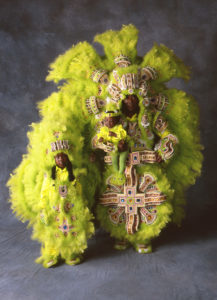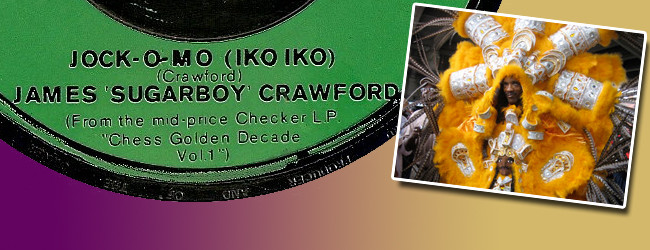
In honor of Mardi Gras, we’re bringing you another entry in American Blues Scene’s exclusive “Brief History of a Song” series.
On Tuesday, the Mardi Gras indians, who spent thousands of dollars and millions of beads constructing wildly elaborate suits, will march through the streets of New Orleans in a complex hierarchy of Kings and Spy Boys and wild men, chanting exotic dirges and dancing in grandiose fashion. Possibly the one phrase that has become deeply inseparable from the history and popular conception of the Indians, Mardi Gras, and, occasionally, New Orleans is “Iko! Iko! Jock O Mo Fee No Nay.” Though the song has been featured in dozens of movies ranging from Skeleton Key and Rain Man to Hangover, what the lyrics mean continue to be somewhat of a mystery. The song, like so many traditional folk songs, has a long and storied history, winding from rushed phonetic translation in New Orleans to a misheard title in Chess Records and far beyond, (and before).
James “Sugar Boy” Crawford is a lifetime New Orleans resident. Sugar Boy and his band played around New Orleans until, by chance, Leonard Chess of the famous blues label Chess Records, heard the band. Chess released a single under the band name Sugar Boy and his Cane Cutters which sold well regionally, and gave Crawford another chance to shine. While watching Mardi Gras indians parade and dance in the early 1950s, he hurriedly wrote down a phonetic interpretation of the indian’s chants, put the chants to music, and in 1953, created one of the most popular, longest lasting Mardi Gras, or “Carnival,” as it’s often called, songs in existence. The song name was called “Chock-a-mo,” though when Crawford told Chess the title over the phone, he misheard it and upon it’s release, Crawford discovered the title was instead called “Jock-a-mo.”
“Iko! Iko! Jock-a-mo Fee No Nay” is a phrase that will, for many, instantly bring to mind the iconic 1965 number by The Dixie Cups. The pop group was in the studio recording, and during some downtime in between takes, they played an impromptu, loose jam of “Jock-A-Mo” that they had remembered from their hometown — even offhandedly using ash trays as drums. What they didn’t know was that producers Jerry Leiber and Mike Stoller were recording the entire affair. The song became a huge hit, the Dixie Cups’ last successful commercial one, and has been a staple ever since.
Crawford received no royalties from the Dixie Cups’ version, despite it being a clearly cut-and-dried cover of his original work. After an extensive legal battle with RedBird Records, Crawford agreed to receive a percentage of royalties for public performances, which means he is supposed to receive a fee for when the song is played on the radio, live, etc. and does not receive any royalties from sales of the track itself.
As to where the oft-repeated, oft-variant phrase comes from, Crawford had this to say in Offbeat Magazine’s 2009 interview with him:
It came from two Indian chants that I put music to. “Iko Iko” was like a victory chant that the Indians would shout. “Jock-A-Mo” was a chant that was called when the Indians went into battle. I just put them together and made a song out of them. Really it was just like “Lawdy Miss Clawdy.” That was a phrase everybody in New Orleans used. Lloyd Price just added music to it and it became a hit. I was just trying to write a catchy song.
The origins of the phrase itself have been embroiled in controversy for decades. Linguists and anthropologists, natives of the area, and professors have speculated on the origins and meaning of the words.
Some say the phrase was of Cajun or Acadian dialect. Cajuns are of French, Native American, and African American descent, and have been around Louisiana since the 1700s. Many Cajuns have been (and continue to be) famous for their colorful dialect and accent, such as contemporary New Orleans blues piano master Lee Pons, so the idea of the phrase being of Cajun dialect makes sense.
Others, like Dr. Evershed Amuzu, who was interviewed in an excellent Offbeat article on the song, say that the phrase is almost strictly of African descent. In a discussion with Offbeat, he picked up the lyrics sheet and, for the most part, accurately sang the melody of the song based on what he knew of African language — a song he had never heard before, but recognized the unique phrasing and was able to guess the melody based on his knowledge of African dialects. The African-descent of the phrase is also a plausible theory. Many Africans who had been kidnapped were sold through New Orleans — a major port. Many freed slaves lived in New Orleans, the city becoming one of the earliest racially integrated towns in the South, and home to some of the first communities of freed slaves and “free people of color.” Furthermore, the Mardi Gras Indians developed their unique and beautiful tradition as a form of respect to the Native Americans, who were thought to have aided escaped slaves in the area.
Others have suggested a Hatian origin, also coming from the slave trade, as well as combinations of all of the aforementioned and more. Clues abound and answers are distant. Yáquimo, a town in Haiti, has been mentioned as possible interpretation of the “Chock o mo.”
A playwright & poet in New Orleans presented this theory, from a mix of Creole and Yoruba, a dominant ethnic group in West-Africa.
Iko! Iko! is Enòn, Enòn!
“Code Language!”Iko! Iko! An Day is Aiku, Aiku nde.
“God is watching.”Jocomo Fee No is Jacouman Fi na
“Jacouman causes it”An Dan Day is ida-n-de
“We will be emancipated.”Jocomo Fee Nan Nay is Jacouman Fi na dé
“Jacouman urges it; we will wait.”
Of course, that loose interpretation arises more questions than answers, such as “who is Jacouman?” Another possible interpretation that has been floating in the iko-sphere is the following:
Iko! Iko! is Akout! Akout! (Creole)
“Listen! Listen!”Iko! Iko! An Day is Akout! Akout! An Deye (Creole)
“Listen! Listen! At the rear”Jocomo Fee No An Dan Day is Chokma Finha an dan deye (a mixture of half Native American, half Creole)
“It’s very good, at the rear”Jocomo Fee Nan Nay is Chokma Finha – Ane (a mixture of half Native American, half Creole)
“It’s a very good year!”
While a number of theories abound, several have consistent themes, such as “Listen! At the rear [or back]!” When the Indians and their troops march, they do so in parade fashion, with a line of elaborately dressed Indians. A number of their shouts and cries are communications, such as the elaborate ritual when two Indian tribes come face to face in the street. The respective kings call to — or more accurately, “playfully” taunt — one another, with each calling chants such as “Hum BOW (you bow)” and “Won’t Bow. Don’t know How.” Therefore, a calling to the party members at the back would be a very plausible explaination.
Despite the varied and widespread ideas and interpretations of it’s phrasing, the song has been emblazoned into the hearts and the minds of the nation, and has risen as one of the loudest and most celebrated songs of the Mardi Gras season. It’s origins steeped in mystery and in all likelihood, much like the city of New Orleans, a gumbo of regional and ethnic backgrounds, it has become as inseparable to the city as Professor Longhair. “Chock-o-Mo,” though based on the long standing traditions of the magical Mardi Gras Indians who will proudly parade through the streets of the Crescent City in Tuesday, has become a tradition in-and-of itself.


3 Comments
Great Article I enjoyed it very much! It’s been my understanding from my time in New Orleans and seeing Mardi Gras Indian practices. That “IKO IKO” was a Chant of warning to other tribes. In the past the The Indians where very violent and Fat Tuesday used to be a time to “Settle Scores” as any “problems” had to be “Over and Done” by Ash Wensday, or forgotten of, and if two tribes should happen to meet while “Masking” on Mardi Gras Day, a Shooting and somebody getting Killed where pretty much “Gar-Ron-Tee’d”. One of the Lyrics to this song goes “See my King all Dress in Red, IKO IKO Ae Ay, Bet you 5 Dollars, He will Shoot You Dead, IKO IKO Ae Ay”. It was thought the efforts of Big Chief Allison “Tootie” Montana. that the Fight between the tribes finally stop and instead of Killing eack other when two Tribes do meet on the street it now becomes Performance Art of the Highest order as now the members square off into a sort of Dance off, and show respect to the others King as the Two Kings stand back in a showoff of “Who’s Prettiest!”.
All that being said the Chant of IKO, IKO” was meant as a warning to any other tribe that might be in the area, Basically it was telling any other Tribe “We’re Coming, Get the HELL Out of the WAY!”